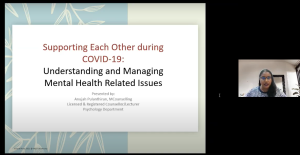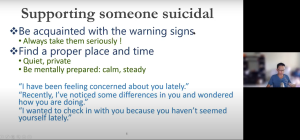The Royal Malaysian Police recorded 468 suicide cases in Malaysia in the first five months of 2021, up from an annual total of 631 cases in 2020 and 609 cases in 2019. This means an average of three deaths by suicide has occurred daily up to May 2021 amidst economically devastating lockdowns as COVID-19 surged in 2020.
Realising the rising importance of mental health during the pandemic, the Psychology Society of INTI International College Subang stepped in to help affected individuals overcome these issues by organising a webinar titled ‘Bringing Hope in the Moments of Darkness’ which featured speakers who are experts on the issue at hand.
“Every year 703,000 people take their own life and there are many others who attempt suicide globally. Every suicide is a tragedy that affects families, communities and entire countries, presenting long-lasting effects on the people left behind. Suicide occurs throughout the lifespan and is the fourth leading cause of death among individuals aged 15 to 29,” shared Anujah Pulanthiran, a licensed and registered counsellor at the Psychology Department of MCounselling.

Anujah Pulanthiran a licensed and registered counsellor at the Psychology Department of MCounselling shared that although suicides are high, it is preventable with the right measures and precautions in place.
She further added, “Suicide is a serious public health problem; however, suicides are preventable with timely, evidence-based and often low-cost interventions. For national responses to be effective, a comprehensive multi-sectoral suicide prevention strategy is needed.”
Suicide prevention efforts require coordination and collaboration among multiple sectors of society, including the health sector and other sectors such as education, labour, agriculture, business, justice, law, defence, politics, and the media. These efforts must be comprehensive and integrated as no single approach alone can make an impact on an issue as complex as suicide[1].
According to Anujah, suicide does not only occur in high-income countries, but is a global phenomenon in all regions of the world. In fact, over 77 percent of global suicides occurred in low and middle-income countries.
“While the link between suicide and mental disorders, in particular, depression and alcohol use disorders, are well established in high-income countries, many suicides happen impulsively in moments of crisis with a breakdown in the ability to deal with life stresses, such as financial problems, relationship break-up, chronic pain and illness, and now a pandemic,” Anujah mentioned at the webinar.
She also emphasized, “The COVID‑19 crisis has heightened the risk factors generally associated with poor mental health; financial insecurity, unemployment, and fear while protective factors such as social connection, employment and educational engagement, access to physical exercise, daily routine, and access to health services, fell dramatically. This has led to a significant and unprecedented worsening of population mental health.”
In addition, experiencing conflict, disaster, violence, abuse, and a sense of isolation are strongly associated with suicidal behaviour. Suicide rates are also high amongst vulnerable groups who experience discrimination such as refugees, migrants, indigenous peoples and prisoners. By far the strongest risk factor for suicide is a previous suicide attempt[2].
“While suicides are on the high, it is definitely preventable. The officials and individuals who are able to help are required to handle these cases delicately. There are a number of measures that can be taken at population, sub-population and individual levels to prevent suicide and suicide attempts,” pointed out Anujah.
Victor Tan, Deputy Chairperson of Befrienders Kuala Lumpur on the other hand shared, “Stigma, particularly surrounding mental disorders and suicide, means many people thinking of taking their own lives or who have attempted suicide are not seeking help and are therefore not getting the help they need. The prevention of suicide has not been adequately addressed due to a lack of awareness on suicide as a major public health problem and the taboo in many societies to openly discuss it. To date, only a few countries have included suicide prevention among their health priorities and only 38 countries reported having a national suicide prevention strategy.”
Victor acknowledged that raising community awareness and breaking down the taboo is important for countries to make progress in preventing suicide.

According to Victor Tan, Deputy Chairperson of Befrienders Kuala Lumpur, raising community awareness and breaking down the taboo is important for countries to make progress in preventing suicide.
“Globally, the availability and quality of data on suicide and suicide attempts is poor. This problem of poor quality mortality data is not unique to suicide, but given the sensitivity of suicide and the illegality of suicidal behaviour in some countries, it is likely that under reporting and misclassification are greater problems for suicide than for most other causes of death,” shared Victor.
While obtaining such statistics is important, Victor stressed that helping out someone who is feeling suicidal is equally significant.
“If you think that someone may be feeling suicidal, encourage them to talk about how they are feeling. You may feel uncomfortable talking about suicidal feelings because you may not know what to say but this is entirely normal and understandable. It might help to let them know that you care about them and that they are not alone. Empathise with them, reassure them that they will not feel this way forever, and encourage them to focus on getting through the day rather than focusing on the future,” he said.
At the end of the webinar, Victor shared some advice with the audience.
“Signs that something is wrong can sometimes be more difficult to spot such as a cheeriness which may seem fake to you or they may joke about their emotions like saying something quite alarming that is disguised as a joke. Don’t ignore your gut feeling if you are concerned about someone. Some people won’t be open up about how they are feeling. A lot of people try to seek help before attempting suicide by telling other people about their feelings. This could be a professional, friend or family member. If someone tells you about how they are feeling, please don’t ignore them.
“Remember that you don’t need to find an answer, or even completely understand why they feel the way they do. Listening to what they have to say will at least let them know you care,” he concluded.
[1] https://www.mind.org.uk/information-support/helping-someone-else/supporting-someone-who-feels-suicidal/about-suicidal-feelings/
[2] https://codeblue.galencentre.org/2021/07/01/malaysia-records-three-daily-suicides-this-year-up-to-may/